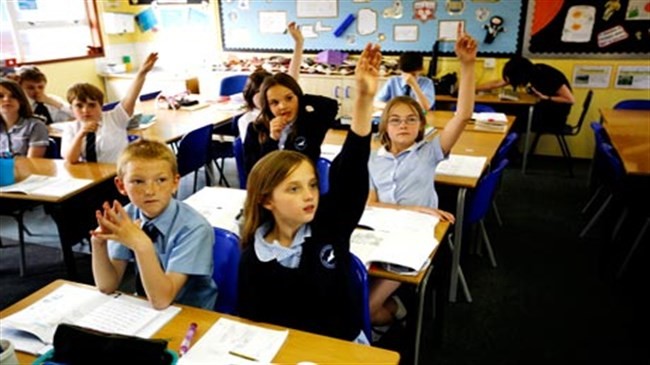By Gavin Mackintosh-
Labour’s plan to scrap SATs and abolish the new reception baseline test has been criticised by the government as a” retrograde step”.
Corbyn unveiled his idea for a new primary school academic system in the Uk at the annual conference of the National Education Union today that his party will end the “regime of extreme pressure testing” if it wins power. He added that Labour intends to introduce a “more flexible and practical” primary assessment system to replace the existing tests and prepared children for life in general.
The announcement by the Labour leader is well intended, but truly a backward step because of an evident rise in standards in primary schools in the past few years. It is for pupils and teachers to adjust to the pressure and prepare more consistently for those exams and not use pressure as an excuse like wimps. The benefits of hard work and long preparation should will benefit committed primary school in later life. Reducing the stress could alternatively be approached by reducing the standard of the exams a bit, if necessary, but scrapping them is really going backwards.
Corbyn’s vow came after a heated debate yesterday at the conference in Liverpool, which resulted in a vote in favour of a ballot for a boycott of all primary tests in 2019-20. Teaching and leadership unions have long warned that the current system puts too much strain on pupils and school staff. Both the National Association of Head Teachers and Association of School and College Leaders backed Corbyn’s proposals, while Dr Mary Bousted, joint general secretary of the NEU, called them “ground-breaking”.
“We need to prepare children for life, not just for exams,” Corbyn told delegates.
“SATs and the regime of extreme pressure testing are giving young children nightmares and leaving them in floods of tears.
“I meet teachers of all ages and backgrounds who are totally overworked and overstressed. These are dedicated public servants. It’s just wrong.”
CONSULATATION
A consultation with teachers and parents is being scheduled to develop a more flexible and practical system of assessment that is tailored to individual pupils and “prepares children for life, not just for exams”.
Schools minister, Nick Gibbs accused Labour of planning to “keep parents in the dark”.
“These tests have been part of school life since the 90s. They have been pivotal in raising standards in our primary schools,” he said. “That’s why Labour governments led by Tony Blair and Gordon Brown supported them. However, Paul Whiteman, leader of the National Association of Head Teachers, said children’s progress could me measured through “everyday teacher assessment and classroom tests”.
CURRICULUM
Under Labour’s proposals include an established assessment system that will “trust and empower teachers to deliver a broader curriculum, not a rigid assessment regime”. Further details won’t be announced until after a consultation, planned for this summer. Sat exams have become tougher and tougher over the years, but have also led to higher standards of academics in many primary schools cross the Uk.
Many more primary schools find the tests very demanding on teachers and students in the lead up to the exams, but primary school pupils only need to work very hard in preparation for these exams. Their parents should hire private tuition in return for the pupils to prepare them well. Pupils whose parents can’t afford tuition but are not fast learners for whatever reason often find these Sats more difficult than others. Those pupils in good primary schools who work hard, and have the right attitude should be fine when taught well by passionate teachers.
Corbyn is playing to the gallery of soft parents who have either not been able to give their children the discipline they need, or whose children suffer from ADHD or dyslexia. Those type of children do not have to sit Sat exams if they cannot sit them. Frustration of children is a poor reason to scrap exams whose preparations can give children a bright start at secondary school, better preparing them for higher institutions of learning , for those who choose to educate themselves further.




